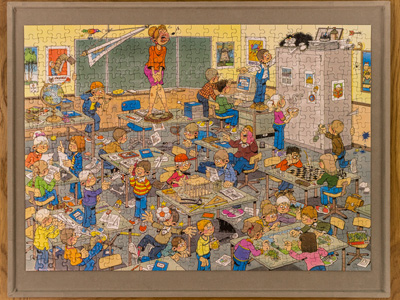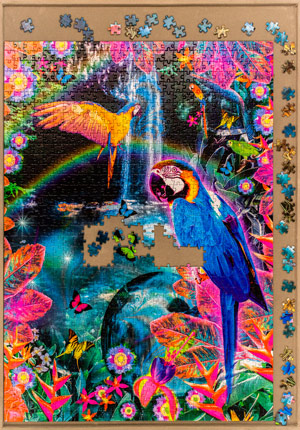Jigsaw Puzzles
Jigsaw puzzles are a great favourite at Christmas. However, why only do them once a year? They have many benefits and are educational for children too.
Exploring the Advantages of Children Engaging in Jigsaw Puzzles
- Jigsaw puzzles cater to various age groups with diverse sizes.
- Encourages family involvement without the stress of competition.
- No time constraints, allowing flexibility in participation.
- Facilitates improvement in short-term memory.
- Engages both sides of the brain, enhancing cognitive skills.
- Enhances spatial reasoning abilities.
- Aids in stress relief, promoting a relaxing family activity.
- Suitable for individual play, fostering independence.
LEARN ABOUT THE BENEFITS OF LEARNING THROUGH QUIZZES
The Freedom of Play
Jigsaw puzzles offer a liberating experience with no set rules. Whether starting from the outside or inside, tackling easy or challenging sections first, playing alone or with others – the freedom to create your own rules ensures an enjoyable experience.
Exploring the Versatility of Jigsaw Puzzles
Jigsaw puzzles offer varying levels of complexity for children aged three and above. Borrowing puzzles from friends allows experimentation to determine the child's proficiency level before purchasing new ones. Striking a balance avoids monotony or frustration.

In a digital age dominated by electronic games, jigsaw puzzles provide a refreshing family activity. Everyone can engage for as long as they desire, fostering a relaxed atmosphere without the pressure of skill-related frustrations.
For meaningful conversations with children, join them in solving a jigsaw. Unlike immersive electronic games, puzzles allow interaction while maintaining focus on the task at hand.
For young children, puzzles serve as an introduction to spatial reasoning, stimulating cognitive development. Requiring engagement from both brain hemispheres, jigsaw puzzles strike a perfect balance between logic and creativity.
Experts affirm that the satisfaction derived from jigsaw puzzles lies in creating order from chaos. Witnessing a child's joy upon placing the last piece highlights the inherent desire for order in all of us.
Jigsaw puzzles provide educational, family entertainment, offering a relaxing and enjoyable experience.
Discovering the Appeal of Jigsaw Puzzles
Contrary to common belief, many individuals who initially think they won't enjoy jigsaw puzzles find themselves irresistibly drawn to them when placed on a table. Notable personalities like the Queen of England and Bill Gates regularly engage in this pastime, highlighting its universal appeal.
FIND OUT WHY KIDS LOVE OUR WEBSITE
Understanding Puzzle Prices

Puzzles come in various shapes and sizes, catering to every budget. With over 300 options on Amazon, prices range from under £2.00 to over £100.00. However, beware of inflated prices, as high costs don't necessarily indicate rarity. Quality cardboard puzzles typically range from £8.00 to £15.00.
While some companies, like Stave in America, produce hand-cut wooden puzzles as artistic pieces, they can be expensive, reaching up to £3,000. Accessories such as boards, cases, frames, and nesting boxes are available for avid puzzle enthusiasts.
For those new to puzzles, begin by seeking out puzzles from friends and relatives before exploring additional accessories.
Another enjoyable method to support your children's education is by participating in online quizzes together. Parents, aunts, uncles, and grandparents can find more information at Education Quizzes.



